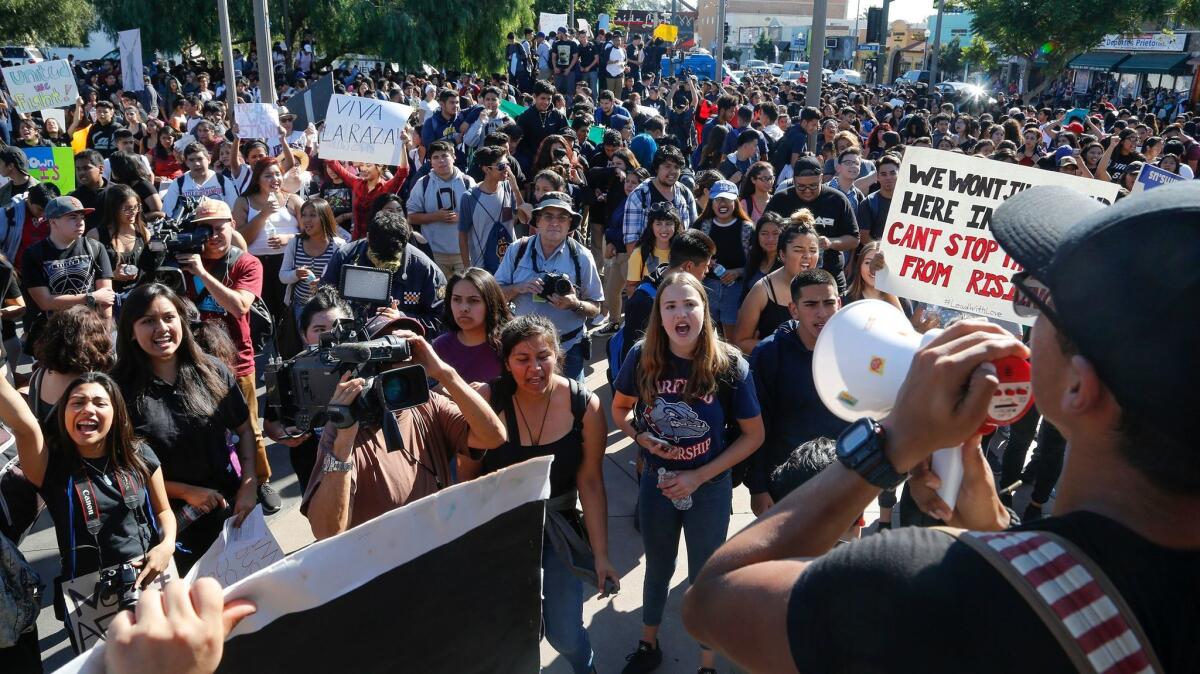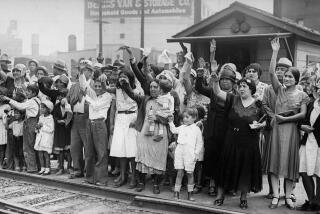Column: If you’d been in the shoes of these immigrants from Mexico, what would you have done?

When it comes to immigration, there’s plenty of rhetoric, none of which is very illuminating.
And then there are stories.
I once met a volunteer who was directing traffic outside the school her children attended near Koreatown. We later talked at her cramped apartment about how she hustled to scratch out a living.
She was undocumented, and I asked if she ever second-guessed her decision to leave Mexico.
Never, she said. As hard as her life was in Los Angeles, it was harder in Mexico, with little hope of advancing. Here, she had a daughter in college.
“If you saw where I came from,” she told me, “you’d understand.”
And so I traveled to her village north of Mexico City, where her brother showed me the farm shanty they grew up in and explained how they bartered with neighbors to put food on the table. Jobs were scarce, especially for women, and schools were as poor as the people.
On another trip to Mexico, I came upon a town west of Puebla with a predominance of women. I asked a man where all the other men were. They went north, he said, to work on farms in the States. The town’s only industry was corn, but local farmers couldn’t compete against the low prices of corn imported from the U.S., where taxpayers spend billions to subsidize farmers.
I thought back on those trips to Mexico when I got a recent email from someone accusing me of supporting illegal immigration. I wrote back to say I don’t support it, I understand it. Not everyone who crosses the border is pure, and schools, hospitals and social services can be overwhelmed by the influx. But if you were destitute, your family was hungry and narco-violence was the norm, what would you do?
This brings me to election night, when I dropped by Dolores Mission Church in Boyle Heights for what was supposed to be a celebration. The crowd watched the tally on television, then grew quiet and thinned out when it looked like Donald Trump would be the next president.
I later caught up with one of the families that left early, and I’m going to withhold names at their request.
The mother and father are in their 40s. They have a daughter in college and a son in middle school.
The father was a truck driver in Mexico, but work was sporadic. He and his wife and daughter lived in a house that was framed, but not completed. The bathroom was an outhouse.
“We were at a point where I had lost my job and thinking, ‘What are we going to do?’” said the father.
His daughter was often hospitalized for respiratory problems.
“We needed money for medication and food, and in that moment, we said, ‘Let’s try to make the situation better,’” said the father.
He had relatives in California, and in the year 2000, they sent $2,500 for him to hire a coyote. After the crossing, the smugglers held on to him, trying to squeeze more money out of his family. The family refused, the father was released and went to work as a gardener. He saved for a year and sent for his wife and daughter, who was not quite 4 years old at the time.
“I used to suck my fingers, and I remember my mom saying I had to stop or I wasn’t going to see my dad. That’s how I stopped,” said the daughter, now 19. “I knew he had gone somewhere but I didn’t know where or why. Before he left, we were very close. I was Daddy’s little girl.”
Mother and daughter crossed without incident, and the family was reunited. The father now works in construction for $17 an hour. His wife works in a garment factory for minimum wage, and they live in Boyle Heights.
They sent their daughter, and then a son — who was born in L.A. and is now 12 — to Catholic schools and encouraged them to study hard and move on to college.
But as a high school sophomore, the daughter found out she needed a Social Security number to apply to college, and she discovered why she didn’t have one.
“I was shocked and then confused, and then it went into sadness,” she said.
In an instant, she went from feeling like a full-fledged American to fearing she’d be sent to a country she barely remembers and does not know. But in her senior year, relief and protection came in the form of Deferred Action for Childhood Arrivals (DACA), President Obama’s offer of temporary protected status for immigrants brought to the U.S. as children if they are law-abiding and either working, going to school or in the military.
The executive action was humane and practical, given the contributions young people can make in the military and as taxpaying contributors. For the Boyle Heights teen, a cloud was lifted. She finished high school, worked two jobs for a while, and now is down to one job along with a full-time college load.
But her protection came at a cost — her parents’ information and status were made available to authorities. The family didn’t worry about that until Trump threatened to get rid of the program and deport all immigrants who are in this country illegally.
The night of the election, as the result became obvious, the student was so distraught, her mother sat at her bedside and held her.
“I basically cried myself to sleep,” said the student.
She fears her parents will be nabbed, the family separated. The night I visited, the brother kept wandering away from our kitchen conversation, as if he couldn’t bear to hear any more. The mother wept several times, a figurine of the Last Supper on the wall behind her.
I told them it wasn’t a sure thing that Trump would act on his word. In fact, he suggested this past week that he may still get rid of DACA, but “we’re going to work something out” for the young people in the program. It remains unclear what that means.
“I’m surrounded by supportive people, and by the grace of God,” the student told me. “From the minute I was born, I’ve been such a firm believer in God and the idea that everything happens for a reason. So that’s what’s keeping me going. All I can do is live in His grace and hope there’s something good ahead.”
Get more of Steve Lopez’s work and follow him on Twitter @LATstevelopez
More to Read
Sign up for Essential California
The most important California stories and recommendations in your inbox every morning.
You may occasionally receive promotional content from the Los Angeles Times.











